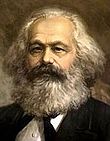
Karl Marx was born in Trier, in the German Rhineland, in 1818. Although his family was Jewish they converted to Christianity so that his father could pursue his career as a lawyer in the face of Prussia's anti-Jewish laws. A precocious schoolchild, Marx studied law in Bonn and Berlin, and then wrote a PhD thesis in Philosophy, comparing the views of Democritus and Epicurus. On completion of his doctorate in 1841 Marx hoped for an academic job, but he had already fallen in with too radical a group of thinkers and there was no real prospect. Turning to journalism, Marx rapidly became involved in political and social issues, and soon found himself having to consider communist theory. Of his many early writings, four, in particular, stand out. ‘Contribution to a Critique of Hegel's Philosophy of Right, Introduction’, and ‘On The Jewish Question’, were both written in 1843 and published in the Deutsch-Französische Jahrbücher. The Economic and Philosophical Manuscripts, written in Paris 1844, and the ‘Theses on Feuerbach’ of 1845, remained unpublished in Marx's lifetime.
The German Ideology, co-written with Engels in 1845, was also unpublished but this is where we see Marx beginning to develop his theory of history. The Communist Manifesto is perhaps Marx's most widely read work, even if it is not the best guide to his thought. This was again jointly written with Engels and published with a great sense of excitement as Marx returned to Germany from exile to take part in the revolution of 1848. With the failure of the revolution Marx moved to London where he remained for the rest of his life. He now concentrated on the study of economics, producing, in 1859, his Contribution to a Critique of Political Economy. This is largely remembered for its Preface, in which Marx sketches out what he calls ‘the guiding principles’ of his thought, on which many interpretations of historical materialism are based. Marx's main economic work is, of course, Capital Volume 1, published in 1867, although Volume 3, edited by Engels, and published posthumously in 1894, contains much of interest. Finally, the late pamphlet Critique of the Gotha Programme (1875) is an important source for Marx's reflections on the nature and organisation of communist society.
The works so far mentioned amount only to a small fragment of Marx's opus, which will eventually run to around 100 large volumes when his collected works are completed. However the items selected above form the most important core from the point of view of Marx's connection with philosophy, although other works, such as the 18th Brumaire of Louis Napoleon (1852), are often regarded as equally important in assessing Marx's analysis of concrete political events. In what follows, I shall concentrate on those texts and issues which have been given the greatest attention within the Anglo-American philosophical literature.Marx's Life and Works
The Early Writings
Economics
Theory of History
Morality
http://plato.stanford.edu/entries/marx/



0 comments:
Post a Comment